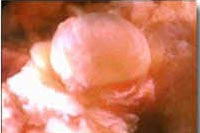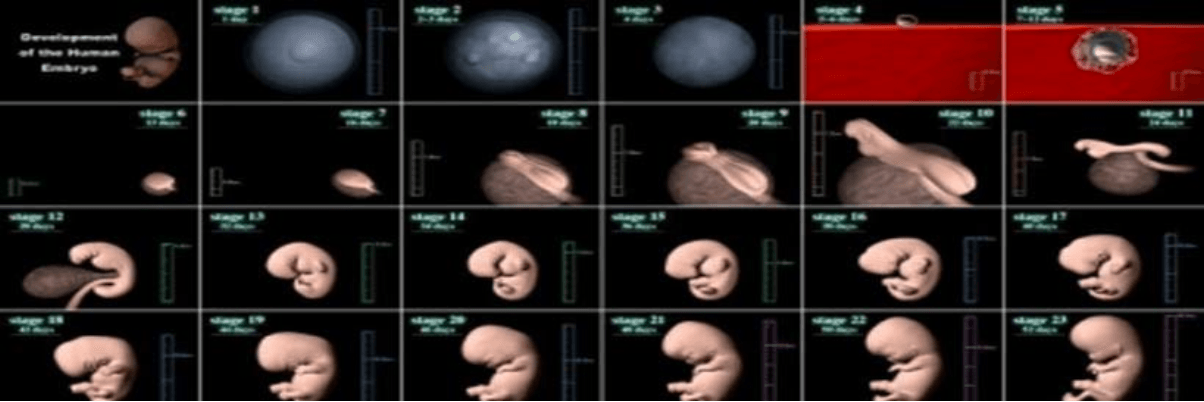The Embryonic Phases
An embryo is a multicellular diploid eukaryote in its earliest stage of development, from the time of first cell division until birth, hatching, or germination. In humans, it is called an embryo until about eight weeks after fertilization (i.e. ten weeks after the last menstrual period or LMP), and from then it is instead called a fetus.
 We present to you Dr. G.C. Goeringer, Course Director and Associate Professor of Medical Embryology at the Department of Cell Biology, School of Medicine, Georgetown University, Washington, D.C.. We met with him and asked him whether in the history of embryology there was any mention of the different stages of embryonic development and whether there were any books on embryology at the time of the Prophet Muhammad (sallallahu ‘alaihi wa sallam) or the centuries after him which mention these various stages, or whether the division into these different stages only came to be known in the middle of the nineteenth century. He said that the ancient Greeks were concerned with the study of embryology and many of them attempted to describe what happens to the fetus and how it develops. We agreed with him that Aristotle, among others, attempted to expound some theories on the subject, but was there any mention made of these stages?
We present to you Dr. G.C. Goeringer, Course Director and Associate Professor of Medical Embryology at the Department of Cell Biology, School of Medicine, Georgetown University, Washington, D.C.. We met with him and asked him whether in the history of embryology there was any mention of the different stages of embryonic development and whether there were any books on embryology at the time of the Prophet Muhammad (sallallahu ‘alaihi wa sallam) or the centuries after him which mention these various stages, or whether the division into these different stages only came to be known in the middle of the nineteenth century. He said that the ancient Greeks were concerned with the study of embryology and many of them attempted to describe what happens to the fetus and how it develops. We agreed with him that Aristotle, among others, attempted to expound some theories on the subject, but was there any mention made of these stages?
Male SpermWe know that these stages were not known until the middle of the nineteenth century and were not proven until the beginning of the twentieth century. After a long discussion, Professor Goeringer concurred that there was no mention of these phases. Thus we asked him if there was any specific terminology applied to these phases similar to that found in the Qur’aan. His reply was negative. We asked him: ‘What is your opinion on these terms which the Qur’aan uses to describe the phases which the fetus goes through?’ After long discussions, he presented a study at the 8th Saudi Medical Conference. He mentioned in the study man’s basic ignorance of these phases. He also discussed the comprehensiveness and precision of these Qur’aanic terms in describing the development of the fetus by means of concise and comprehensive terms which convey far reaching truth. Let us listen to Professor Goeringer as he explains his opinion:
“In a relatively few aayahs (Qur’aanic verses), is contained a rather comprehensive description of human development from the time of the commingling of the gametes through organogenesis. No such distinct and complete record of human development such as classification, terminology, and description existed previously. In most, if not all, instances, this description antedates by many centuries the recording of the various stages of human embryonic and fetal development recorded in the traditional scientific literature.”
The discussion with Professor Goeringer led us to talk about a fact which was discovered recently and which would eliminate any controversy. Although the virgin birth of Christ has been a Christian belief for centuries, some among the Christians insist that Christ must have had a father, as a virgin birth is “scientifically impossible”. They argue this, and perhaps they do not know, that there could be a creation without a father. The Qur’aan replied to them and has used as an example the creation of Adam. Allah said: The similitude of Jesus before Allah is as that of Adam; He created him from dust, then said to him: “Be”: And he was. (Qur’aan 3:59).
There are three types of creation:
- Adam, who was created without a mother or father
- Eve, who was created without a mother
- Jesus Christ, who was created without a father
Therefore, the One who was able to create Adam without a father or a mother is also able to create Jesus from a mother and without a father. In spite of this, the Christians still continue to argue even though Allah has sent them evidence after evidence and proof after proof. Then when they are asked why they persist in this controversy, they reply that they have never seen or heard of anybody being created without a father and a mother. But modern science now revealed that many animals and beings in this world are born and reproduced without fertilization from the male of the species. For example, a male bee is no more than an egg which has not been fertilized by the male, whereas the egg which has been fertilized by the male functions as a female. Moreover, male bees are created from the eggs of the queen but without fertilization by a male. There are many other examples such as this in the animal world. Moreover, man today has the scientific means of stimulating the female’s egg of some organisms so that this egg develops without fertilization by a male.
Let us read the words of Professor Goeringer: “In another type of approach, unfertilized eggs of many species of amphibians and lower mammals can be activated by mechanical (such as pricking with a needle), physical (such as thermal shock), or chemical means by any of a number of different chemical substances, and continue to advance to stages of development. In some species, this type of parthenogenetic development is natural.”
A rip female ovumAllah has given us the definitive answer and he used Adam, whom they believe in, as an example of a human being who has no father or mother. The Christians regard as deviance the fact that a human being can be born without a father. Thus, Allah has shown them an analogy of a human being who had no father and no mother, that is, Adam. The Qur’aan says: The similitude of Jesus before Allah is as that of Adam; He created him from dust, then said to him: “Be”: and he was. (Qur’aan 3:59).
 Allah has willed that there be such scientific advancements and discoveries which provide proof after proof of the truth which has been revealed in the Qur’aan. It is in this way that the verses of this glorious book were revealed with the passage of time. The verses become known to the foremost scholars and scientists of our religion and of generations to come. Science will never deplete the wonders of the Qur’aan.
Allah has willed that there be such scientific advancements and discoveries which provide proof after proof of the truth which has been revealed in the Qur’aan. It is in this way that the verses of this glorious book were revealed with the passage of time. The verses become known to the foremost scholars and scientists of our religion and of generations to come. Science will never deplete the wonders of the Qur’aan.
And those to whom knowledge has come see that the (Revelation) sent down to you from your Lord – that is the truth, and that it guides to the path of the Exalted (In Mighty), worthy of all praise. (Qur’aan 34:6).
Allah, may He be Exalted and Glorified, said in the Qur’aan: And you shall certainly know the truth of it (all) after a while. (Qur’aan, 38:88).
Allah also said: For every prophecy is a limit of time, and soon shall you know it. (Qur’aan 6:67).
And He said: Soon will we show them our signs in the (furthest) regions (of the earth), and in their own souls, until it becomes manifest to them that this is the truth. Is it not enough that your Lord does witness all things? (Qur’aan 41:53).

